The Diversity Strategy at Ruhr University Bochum
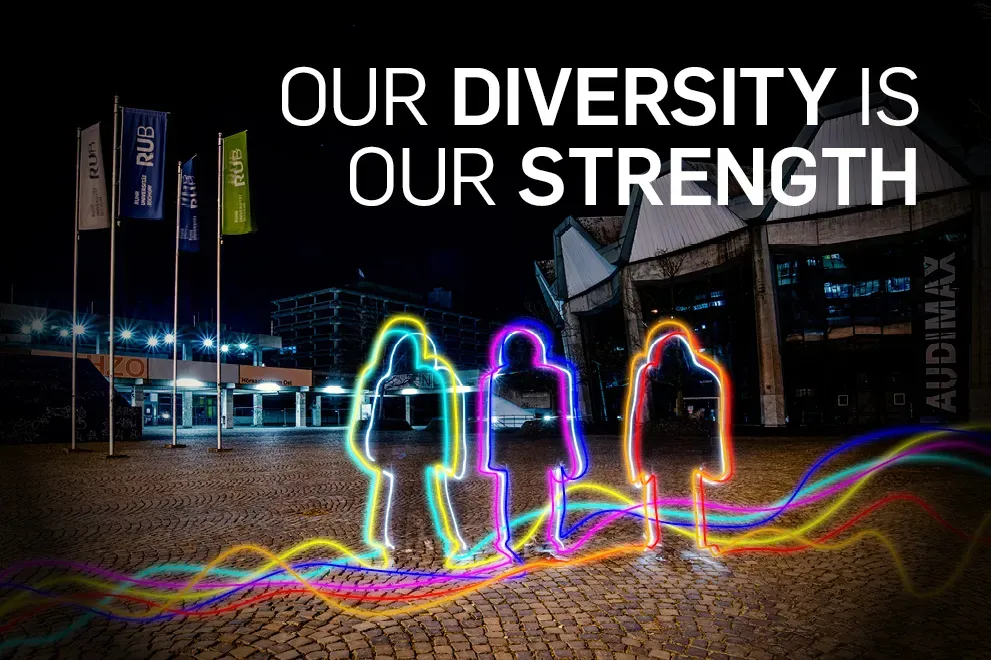
The diversity strategy at Ruhr University Bochum
- recognizes and values diversity
- focuses on people who need support
- counteracts discrimination
- leads to academic excellence and diversity competence
- promotes a sense of belonging in a diverse community
(1) Basic challenges of a diversity strategy
The goal of the diversity strategy at Ruhr University Bochum is to ensure that people in all their diversity are included in research, teaching, studies, and administration and can freely develop their talents. Differences such as ethnicity, nationality, or gender should not lead to discrimination. Such differences are irrelevant when it comes to academic and administrative skills or performance. Diversity policy therefore seeks to address stereotypes and structural inequality in a targeted and conscious manner, to make diversity categories visible, to discuss them, and to educate people about them. Only in this way is it possible to recognize discrimination and act against it. That means: This paradox involves first highlighting differences to ultimately neutralize their relevance and foster equal participation. Diversity policy must deal with this paradox - emphasizing differences while at the same time relativizing them - in a strategically astute manner.
The diversity strategy presented here pursues three different goals: normalization, empowerment, and deconstruction or questioning of notions of normality. (1 footnote: This systematization goes back to Mai-Anh Boger, Politiken der Inklusion. Die Theorie der trilemmatischen Inklusion zum Mitdiskutieren, Münster 2019.) The first goal corresponds to the right of "others" to participate, the second to the right to assert one's own identity in order to develop self-confidence, and the third to the right to refuse normalization. There are people affected by all three goals, and all three are justified. However, it is not possible to satisfy all demands at once; rather, it is important to clarify which demands are being met with a particular strategy and which are not.
Identity politics is important to many as a strategy for empowerment because the difference from "normality" is an anchor that gives them a sense of identity and allows them to discuss their experiences of discrimination in safe spaces without fear of being hurt. At the same time, the identity politics perspective of empowerment tends to close itself off from the outside world and confirm, rather than question, the very categories and attributions that underlie discrimination. The strategy of normalization aims at participation, but in doing so perceives the people affected as deficient—for example, people with disabilities or so-called working-class students.
"More diversity and anti-discrimination means more freedom, more self-determination, more self-development."
Both need "disadvantage compensation" to participate successfully in "normality." This perspective is helpful in many ways because it enables participation in the academic system or at university and takes unequal conditions into account. At the same time, "normality" is not questioned, and disability or origin are fundamentally seen as problems. This is completely different in the strategy of deconstruction, in which "normality" and the existing order are problematized: Why do we describe the "first generation student" as deficient when, unlike some continuing-generation students, they have learned to assert themselves even in the face of resistance? And is the label "first generation student" even relevant, or does it perhaps assign a person an identity or "victim role" that is no longer relevant to them? Deconstruction challenges the notion of disadvantage itself. From this perspective, being a ‘first generation student is not a deficit, but an equally valid background – a source of strength rather than stigma. Consequently, it is not a matter of adapting to "normality" as a supposedly deficient first-generation student, but of successfully emancipating oneself from it and the external evaluations that accompany it and using the skills that have developed as a resource. From this perspective, support measures for children of academics would be more advisable, enabling them to critically reflect on their own habits.

Every perspective has its merits and its blind spots. It also becomes clear why the different strategies conflict with each other and even must conflict. These tensions must be addressed in diversity policy, sometimes by caring for the disadvantaged and sometimes by refraining from doing so, because offering help would be paternalistic and would generally be oriented toward the existing order. It is therefore important to be sensitive to the exclusions that every inclusion strategy entails and to remain calm because there are no simple solutions. What is needed is a selective, situation-specific, and reflective change of strategy. There is no “one size fits all" solution. Rather, it is about an experimental approach that remains flexible, seeks to avoid dead ends, and recognizes the complexity of diversity policy. At Ruhr University, this is ensured through regular exchanges among those responsible.
(2) Diversity Fatigue
Diversity policy is fundamentally at risk of producing paradoxical effects. It is therefore essential to proceed wisely, pragmatically, and with a sense of proportion to avoid diversity fatigue. This phenomenon describes a situation in which people become desensitized and uninterested in diversity and inclusion efforts. Excessive messaging and perceived disruptions to one’s sense of normality regarding one's own sense of normality contribute to diversity fatigue. To counteract this, we attach great importance to ensuring that measures to promote diversity are not designed as purely top-down requirements but rather involve all interested university members in discussions and take their perspectives into account. In addition, we continuously reflect on the usefulness and added value of diversity initiatives to evaluate measures and promote a common understanding and commitment to greater equality of opportunity.
(3) Diversity as a program
As a university of the Ruhr region, Ruhr University Bochum is a highly diverse institution. It is shaped by a region that has undergone many transformation processes in recent decades, particularly Bochum, for example regarding the transformation of the former Opel factory site into an industrial, technology, and knowledge campus. The university's motto, "built to change," is therefore paradigmatic for the Ruhr region and the culture of Ruhr University, which has always seen itself as a reform-minded university. Since its founding, RUB has been committed to including first-generation students and people with a migration background in the university system. Almost half of our students are now first-generation students. More than a third of our students have an international family background, more than 20% of students report that German is not their first language, and a similar proportion do not hold German citizenship. (2 Footnote: Study on experiences of discrimination among students at Ruhr University Bochum, 2021.)
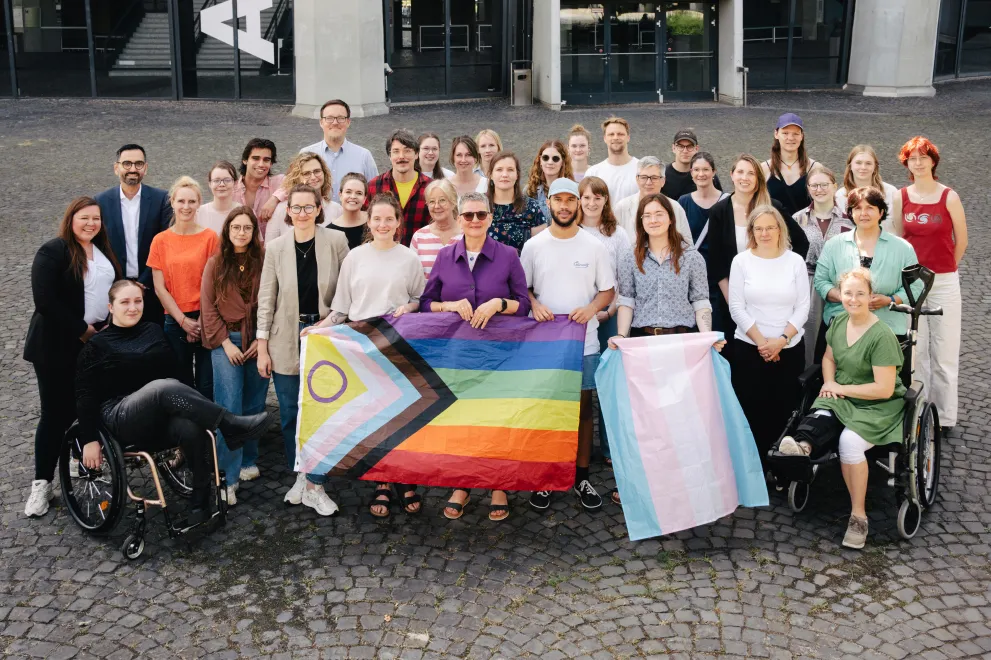
In addition, 16% of our students are international. Internationalization and diversity are therefore closely linked and enrich the university. Ruhr University also set an early example in promoting women, appointing women to professorships in its early years. Today, Ruhr University has an above-average proportion of female professors, which has increased from 11% in 2004 to 33% in 2024. In 1986, it was the first university in Germany to introduce the position of women's representative.
A central challenge of the diversity strategy is to interlink the areas of diversity, equality, and inclusion in such a way that equality and inclusion, both of which are enshrined in law, continue to be addressed and represented independently, while at the same time being effectively coordinated and considered together with other dimensions of diversity and their intersectional interrelationships under the umbrella of the Vice-Rectorate for Diversity. The aim is to create synergies, avoid competition, and work together to ensure equal opportunities for all status groups.
"For me, diversity means recognition in diversity."
Diversity policy is not only about the visibility of diversity and the enrichment of university and campus life through diverse perspectives (diversity is our strength), but also about anti-discrimination. Many students at the RUB have already experienced discrimination. (Footnote 3: Study on experiences of discrimination (see above), also relevant to the following.) This particularly affects female, disabled, poor, queer, and Muslim students, as well as students with an international family background and international students. Many people with an international family background experience racism in their everyday lives. Jewish students are increasingly confronted with antisemitism. Discrimination is not only a moral problem but also has a significant negative impact on academic performance and mental health. Employees in science, technology, and administration also must contend with experiences of discrimination that have similarly negative effects. Ruhr University is therefore expressly committed to ensuring that all students and employees can move around the campus safely – free from fear of threats, intimidation, or assault.
Anti-discrimination is structurally anchored at the central level in the Anti-Discrimination Office, the Equal Opportunities and Disability Representatives, the Inclusion Officers, and the Representative for Students with Disabilities. The anti-discrimination policy adopted by the Senate in January 2023 also obliges all university members to prevent discrimination wherever possible and to take active measures against it. The policy sets out defined principles and guidelines for action and informs all university members of their rights in cases of discrimination, as well as managers and teaching staff of their duties and responsibilities towards their employees and students.
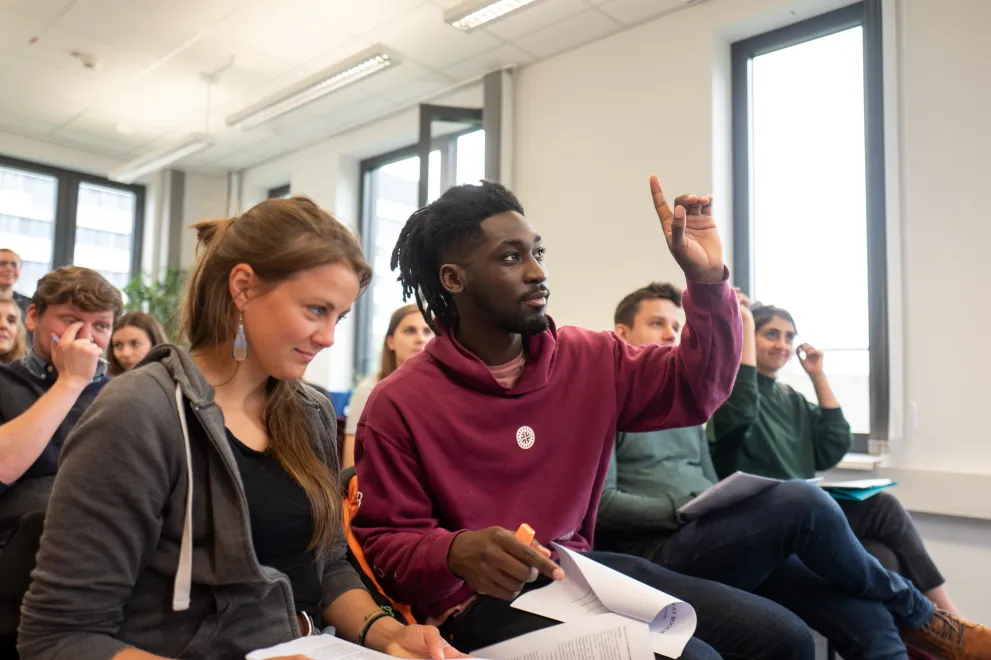
At Ruhr University, we strive to continuously develop our diversity policy and talent promotion to anchor diversity even more firmly in the university's structures and improve the quality of participation in all areas. This project is supported by the innovative RUB Talent Development program. It includes initiatives ranging from talent scouts at schools and the Ruhr Teaching Scholarship for teaching students committed to educational equity to participation in the RuhrFutur education initiative, which recruits "Talents4Teachers" in the Ruhr region. Projects aimed at integrating international students and researchers — such as Studienbrücke, Students at Risk, or Studienspur (for Scholars at Risk and Ukrainian refugees) — are also part of RUB’s significantly expanded internationalization strategy for 2024. These initiatives reflect the values stated in the mission statement paragraph "We live freedom and diversity in teaching and learning."
The focus on teaching and studies, together with RUB’s membership in the European university network UNIC — The European University of Cities in Postindustrial Transition, and its UNIC Joint Degree program Superdiversity in Organizations, Education, and Society, reaffirm the university’s strong commitment to the core values of diversity and participation.
"For me, diversity means that all people are seen with their characteristics."
There are also points of contact with the RUB's sustainability strategy. This particularly applies to social sustainability. Social sustainability means promoting equal opportunities, social justice, and strong communities. This is of particular interest to Ruhr University because many of its students have limited financial resources, faced a variety of challenges, and had to live with significantly more risks than students who are financially secure. Expanding the scholarship culture, developing peer support, and providing greater certainty regarding academic careers are therefore key issues that we are pursuing. „New Career Paths" for early career researchers therefore place particular emphasis on reliable and transparent framework conditions.
Ruhr University sees the diversity of its members as a key strength. It aims to ensure that every person can freely develop their talents regardless of their gender, cultural, socioeconomic, and biographical background. For a modern university that strives for excellence in science, it is crucial to make use of all available talent resources. The added value of diverse research teams has been scientifically proven. For example, gender and diversity medicine has led to a paradigm shift in medicine and has already saved many lives. The diversity of perspectives and backgrounds in a diverse research team leads to new research questions, innovative approaches, and intercultural learning experiences. It is therefore essential to enable women, first-generation academics, people with care responsibilities, people with an international family background, people with queer identities, people with disabilities or chronic illnesses, neurodivergent people, and international university members to participate fully in the scientific system and in the workplace at Ruhr University.
The mission statement process carried out in 2022 showed that many university members have a comparatively high sense of belonging to Ruhr University. This sense of belonging is relevant for all diversity categories and is incorporated into diversity strategy considerations. A sense of belonging counteracts the fragmentation of the university community into many different groups (identities). It is also essential for individuals to feel that they are an integral part of the community and motivated to help shape the university. Community building is particularly important for international members of the university, who often feel particularly vulnerable and isolated. An important step in this direction is the Welcome Office of the City of Bochum, which was established in 2025 at the initiative of RUB.
With its inclusive and community-promoting diversity policy, RUB contributes to an appreciative culture and environment in which its members can develop and perform. Status group diversity must also be considered. In the hierarchical structure of a university, students, technical and administrative staff, early career researchers, and professors have different experiences with marginalization and recognition. To strengthen the sense of belonging of all groups, it is essential to reflect on the framework conditions and needs of each status group and to develop measures that specifically counteract authority abuse.
A sense of belonging is crucial for achieving institutional and academic excellence, as it expresses a holistic perspective on diversity and inclusion and has a direct impact on university culture. This can be experienced, for example, at the annual Diversity Day, which celebrates the diversity and togetherness of the university community.
From a diversity perspective, we understand excellence as inclusive excellence — it promotes the selection of the best by consciously recognizing and including those who have not been or have been insufficiently focused on in the scientific community. It refers not only to scientific careers, but also to the successful education of students who are to be prepared for a highly diverse society through their studies.
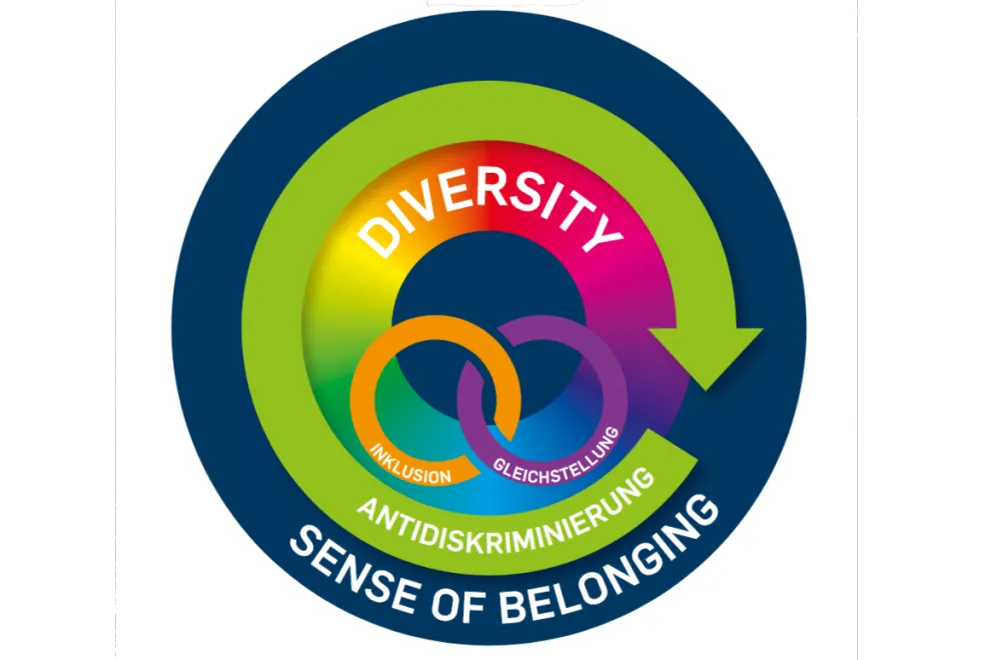
(4) Structures, objectives, focus areas
Offices, responsibilities, and commissions
The Rectorate of Ruhr University understands diversity as an integral part of university development. The topic of diversity is therefore firmly anchored as a cross-cutting issue in the areas of studies, teaching, research, administration, organizational development, and human resources. Diversity is visible as a separate topic and at the same time permeates the structures of the university as a natural part of university policy.
The topic of diversity is structurally anchored within the Rectorate through the Vice-Rectorate for Diversity, Inclusion, and Talent Development, which is responsible for strategic governance and long-term visibility of the topic. It was a strategic decision in 2021 to create a Vice-Rectorate for Diversity and to anchor diversity as a task for the entire Rectorate. As part of this, a University Commission for Diversity was established to advise the Senate and the Rectorate on diversity issues and to adopt guidelines and recommendations for action. The Anti-Discrimination Office is assigned to the Vice-Rector for Diversity. The Anti-Discrimination Officer advises university members who are affected by discrimination, supports institutions in dealing with incidents of discrimination, conducts training, and works on the development of diversity measures. The Our Campus project is affiliated with the Anti-Discrimination Office. It deals with sexism and sexual violence in the university context and conducts training and campaigns. It also advises individuals and institutions on awareness-raising measures.
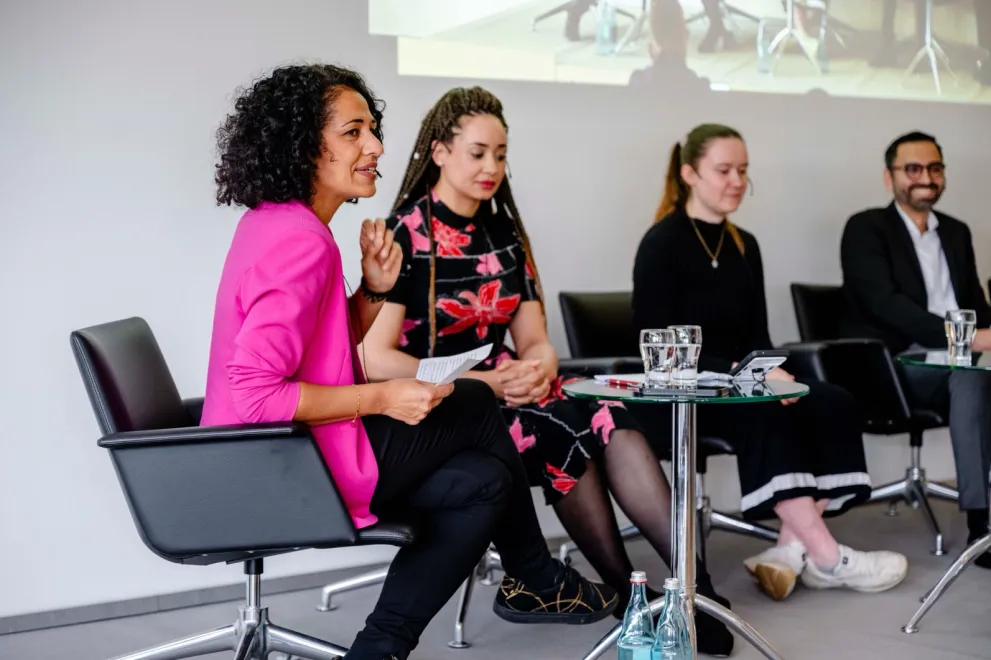
RUB is committed to equality in studies, science, technology, and administration. The central equal opportunities officer is the central point of contact and works to promote gender equality in university committees and commissions. They are advised by the Equal Opportunities Commission. Equal opportunities are also a cross-cutting task to which all areas are committed. The framework plan for equality defines the associated tasks and goals at the central level. Target agreements have been established with the faculties and central academic institutions, which in turn are an integral part of the binding perspective agreements between the Rectorate and the faculties. They serve as guidelines for concrete measures and strategies to ensure that women are promoted in areas where they are underrepresented. There is still a leaky pipeline in academia. Despite achieving gender parity among students, women continue to be disproportionately underrepresented in higher academic ranks. There is a clear need to catch up, particularly in the so-called STEM subjects. Our mentoring programs, unconscious bias trainings, and gender-equitable appointment procedures are examples of RUB's strong commitment to equality and equal opportunities. The Rectorate has also committed itself to actively and specifically reducing the gender pay gap. Thanks to its wide range of instruments and measures, RUB was awarded the title of "Gleichstellungsstarke Hochschule" in the 2030 Program for Women Professors. This must be continued and further developed.
The Equal Opportunities Office with its central equal opportunities officer(s) is complemented at the decentralized level by decentralized equal opportunities officers. Similarly, decentralized diversity officers have also been established in the faculties at RUB to address diversity policy issues on site. To promote decentralized engagement and cooperation between decentralized equality and diversity officers, the Lore Agnes Vision Program was developed in 2024, which allocates annual funds to the faculties for the implementation of equality and diversity activities. As part of the Lore Agnes Vision Program, individuals are also honored with an award if they have made a significant contribution to advancing diversity at the university alongside their regular responsibilities.

The University Development Plan is the central instrument that guides the strategic direction and development of the university and sets its long-term goals. The aim is to focus on diversity, equality, and inclusion as cross-cutting issues and to incorporate them into all areas of the university's work. In terms of research, the aim is to firmly establish gender and diversity research, also in cooperation with the University Alliance Ruhr. Regarding teaching, RUB strives for diversity-sensitive development of its degree programs and teaching. In addition, the Rectorate and the respective faculty or central academic unit (ZWE) enter into development agreements through a collaborative process. These agreements reflect the strategic goals of the university’s development plan, and the faculties or ZWEs commit to defined key objectives.
In Germany, 16% of students have a disability or chronic illness that makes studying more difficult. At RUB, the main point of contact for these students is the Representative for Students with Disabilities and/or Chronic Illnesses. In 2023, the Rectorate and Senate adopted a comprehensive Inclusion Plan for studying and teaching. It outlines a broad range of measures aimed at creating an accessible and inclusive learning environment. Key goals include implementing reasonable accommodations in examinations and academic regulations, providing targeted support services, offering guidelines for inclusive teaching, and ensuring accessible university communication. The university’s Inclusion Round Table regularly advises the UKD (Commission for Diversity) on student- and staff-led initiatives that improve accessibility across faculties. Faculty-appointed inclusion coordinators help raise awareness of available resources and serve as decentralized advocates for accessibility. RUB will receive funding through the state’s “Inclusive University” program until 2026. A major priority going forward is to secure and expand existing structures, especially the highly valued Contact Point for Barrier-Free Exams (KoBaP), which has become indispensable. There is also a need to develop a dedicated inclusion strategy for academic and administrative staff. Disabilities and chronic illnesses are still often perceived as stigmatizing, and many affected individuals hesitate to disclose their condition for fear of discrimination. As a result, too few apply for official recognition of their disability. Raising awareness about disability and ableism remains crucial. RUB is committed to providing tailored support for employees with disabilities or chronic illnesses and to improving working conditions — including structural accessibility — across the board.
"Diversity means for me: more interesting experiences, exposure to new things."
Regarding queer people, we have installed all-gender sanitary facilities and a significant number of all-gender toilets by converting existing toilet facilities. We have also developed a guide to gender-inclusive language, because diversity must be anchored not only structurally but also communicatively. In the future, it will be important to defend these measures in a socio-political climate that increasingly puts pressure on non-heterosexual, non-binary/gender-diverse, and trans people and to protect queer people from attacks.
To improve the compatibility of studying or working and family life for (especially female) students and employees, the RUB has been committed to establishing a family-friendly university culture for many years. It has initiated and implemented numerous measures to improve compatibility. The issue is firmly anchored in the "Family-Friendly University" department. Despite its own daycare center, UniKids, and places in other daycare centers, capacity is still insufficient. Ruhr University is striving to expand its capacity, improve conditions for studying and working parents, and support university members in caring for relatives.
One issue that is often neglected when it comes to diversity is religious diversity. Intercultural learning processes are particularly valuable in this field because they help to balance social conflicts on a small scale. Ruhr University has many Muslim students and employees for whom regular prayer is a necessity. In 2022, a room of silence was set up in the cafeteria building, which is open to all university members who wish to pray, seek peace and quiet, or care for their mental well-being. A study conducted in 2024 shows that the room of silence has been well received by its various visitors (both religious and non-religious). An advisory board ensures that the concept is continually reviewed and developed in cooperation with the AKAFÖ. Religion is often a source of tension, as illustrated by debates surrounding the Middle East conflict, which can lead to local incidents of antisemitism and anti-Muslim racism. It is therefore crucial for the university to provide informational events, encourage open dialogue on politically sensitive topics, and foster a culture of respectful listening and tolerance.
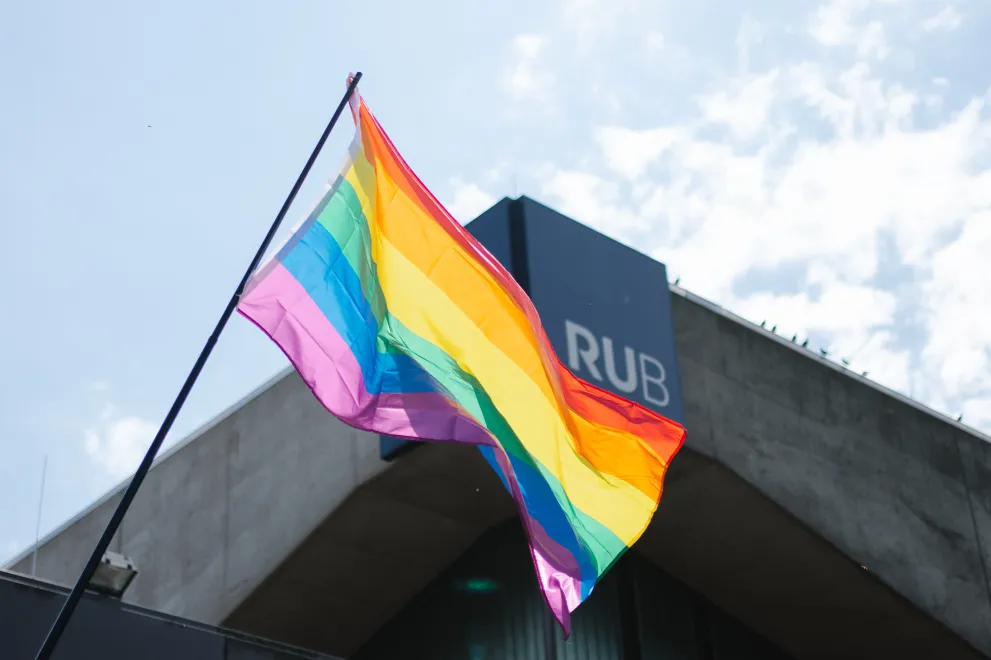
Future focus
In February 2025, the Ruhr University was awarded the „Vielfalt Gestalten“ certificate by the Stifterverband. The certificate recognizes that the RUB has successfully implemented many diversity measures in a short period of time and developed a diversity-oriented university culture. This progress must continue to be supported. The certification followed a rigorous two-and-a-half-year audit process, which included numerous workshops, discussions, and reflections. This process laid the foundation for the diversity strategy presented here. A total of 25 initiatives were developed to embed diversity sustainably within the university's structures, promote a culture shift toward diversity, recognize commitment to diversity, and strengthen cooperation within the UA Ruhr. These goals have largely been achieved, with most of the initiatives already implemented. As part of ongoing re-audits, targets and measures are regularly reviewed and updated, ensuring that the strategy remains dynamic and integrated into continuous improvement processes rather than having a fixed term.
The audit provided detailed insights into the specific challenges that still exist around diversity at the university and need to be addressed. The first thing to mention here is transparent communication. The university’s communications department has launched a diversity website featuring the latest news, contacts for various counseling centers, and plenty of additional information. However, this alone is not enough to effectively engage the diverse community of a large university like Ruhr University. Newsletters and social media also have limited reach. Therefore, beyond digital communication, face-to-face formats — such as workshops, dialogues with the Vice-Rector, and direct engagement with faculties and different groups — need to be further developed and sustained. Diversity efforts should not be confined to specific offices but must be supported by a culture of participation. The goal is to involve as many people as possible in conversations about diversity and to embed diversity issues into everyday university life.
A strategic priority is expanding cooperation across the UA Ruhr. The vice-rectors for diversity at TU Dortmund University, the University of Duisburg-Essen, and Ruhr University have developed a joint diversity strategy and a mission statement on diversity and internationality. Regardless of the success of the Excellence Strategy, it is important to expand this cooperation. A research community for diversity is to be formed to coordinate network diversity and gender research at the three locations and to develop joint projects. Diversity promotes forward-looking solutions in science. The plurality of perspectives and backgrounds encourages innovative research projects and the development of new horizons. Our joint activities also relate to the coordination of existing and future measures to promote and support diversity and equality. In the area of teaching, a joint certificate or micro credential for diversity and gender will be introduced for students within the UA Ruhr in 2025. An anti-discrimination network with collegial case consultation and joint events and campaigns already exists at the UA Ruhr level. These cooperation projects are to be further expanded and concretized.
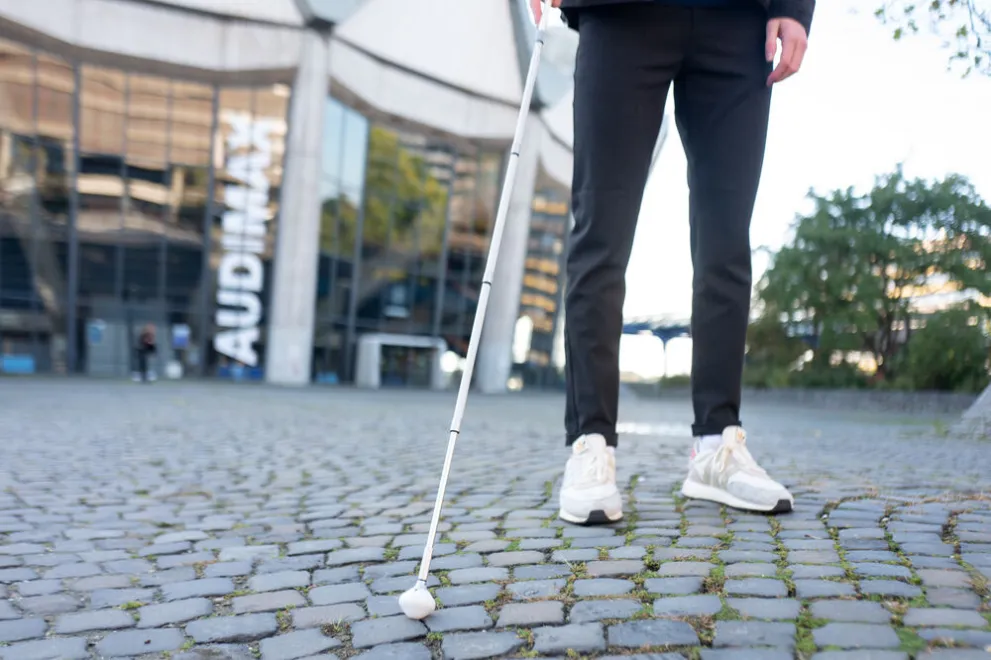
Another goal for the future is to establish diversity monitoring. So far, we know little about the composition of the group of researchers. It is apparent that the heterogeneity of the student body is continuously increasing, but the professorial members are significantly less diverse. This is particularly true with a focus on people of color, who are underrepresented among professors. The aim of a joint project by the university alliance is to systematically record the diversity of academics — from the doctoral phase to the start of a professorship — to examine obstacles in the career stages on the path to a professorship with regard to diversity aspects, and to develop measures that strengthen equal opportunities in the qualification phase in the German higher education system. With this project, the UA Ruhr is doing pioneering work in the field of diversity monitoring. Based on evidence, this will lead to the recognition and development of the potential of diversity for innovation and excellence in UA Ruhr research. Proven measures will contribute directly to DFG’s research-oriented equality and diversity standards for UA Ruhr cluster projects. At Ruhr University, the findings from this project will also be directly linked to “New Career Paths” for early career researchers. Ruhr University also plans to monitor students to provide them with more personalized and relevant information, especially during onboarding at the start of their studies. Additionally, we aim to gain a better understanding of the challenges students face so we can address their needs more effectively and evaluate the success of mentoring programs and other support measures.
The COVID-19 pandemic has led to a marked rise in mental health challenges among students and staff. RUB is committed to promoting the health and resilience of its community members. Health literacy is a crucial skill for the future and a key factor in ensuring equal opportunities, especially since marginalized students often experience higher levels of psychosocial stress. The Psychological Student Counseling Service focuses on student mental and physical management, offering targeted prevention and support programs. The Department of Strategic Personnel Development provides services to strengthen employees’ mental well-being and trains managers to foster healthy working conditions. Additionally, a dedicated contact point is being developed for neurodivergent individuals to offer tailored advice. In collaboration with the student initiative Campus Neurodivers, efforts will be made to raise awareness of the specific challenges and needs faced by neurodivergent students and staff.
Going forward, efforts should focus on further expanding unconscious bias training for managers, particularly in the context of personnel selection processes. So far, unconscious bias videos have been used in appointment committees, and appointment officers have been encouraged to attend relevant training sessions. Newly appointed professors are also urged to complete unconscious bias training. The concept of unconscious bias refers to automatic distortions in perception and judgment that affect everyone and often go unexamined. For example, people tend to view those who are like themselves as more likable and competent than others. As a result, unconscious biases can unfairly advantage or disadvantage certain individuals or groups during selection processes. This undermines objective decision-making based on merit and can prevent the best candidates from being chosen.
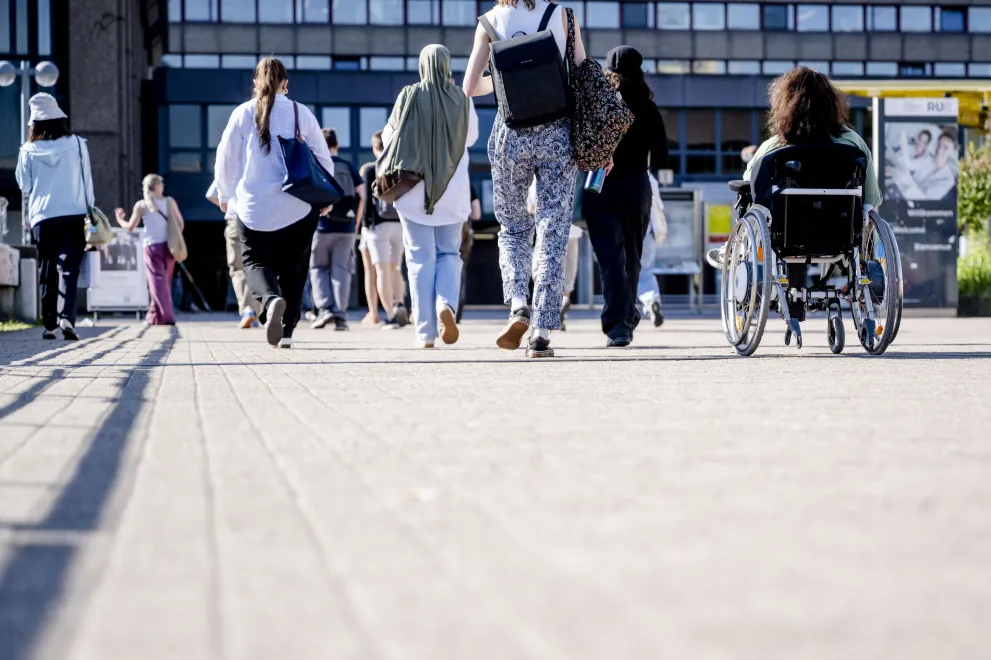
(5) Citizenship und Demokratiebildung
A pressing social challenge Ruhr University must address more intensively in the future is the threat to democracy. Radicalizing movements and parties increasingly call liberal democracy and the values and lifestyles it represents into question. Researchers across all disciplines — especially those in gender and diversity studies — are facing hostility and defamation, which is unacceptable. Going forward, we will focus more on how to effectively protect scholars from attacks on academic freedom.
Ruhr University recognizes its social responsibility to promote democracy. Universities have a fundamental role in educating and training students to become responsible citizens and ensure that everyone, regardless of their background, can study and participate in university life. From a research perspective, the right to conduct free and uncensored research, as guaranteed under the German constitution, is essential. Furthermore, universities must address critical societal issues and foster a culture of open debate. In doing so, they make a vital contribution to safeguarding democracy. Conversely, democracy is the foundation of academic freedom and university autonomy.
"For me, diversity is an essential basis for quality."
Committed to fostering a pluralistic, diversity-sensitive, and cosmopolitan culture on campus and beyond, Ruhr University takes a clear stand in support of liberal democracy and against all forms of extremism. To meet these new challenges, the Center for Science Didactics and the Anti-Discrimination Officer offer training programs for faculty and management on how to respond to anti-democratic statements and actions. Discussions with faculties are ongoing to develop further initiatives. Additionally, targeted training and exchange opportunities on democracy education are offered to employees across all status groups. Special discussion formats are also provided for students, with particular attention to vulnerable groups. The goal is to promote dialogue, mutual understanding, and cooperation across all differences of origin, gender, and culture.
Considering the multiple crises facing society today, it is crucial to understand the complexity of social developments. As a center of scientific inquiry, the university rejects simplistic explanations and so-called alternative facts. Instead, it counters misinformation with evidence-based knowledge, carefully analyzes social conflicts and challenges, and actively resists one-sided perspectives. Through this approach, Ruhr University contributes meaningfully to the development of democracy, the promotion of pluralism, and the cultivation of active citizenship.
